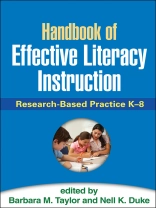This highly readable handbook synthesizes the best research on K-8 literacy instruction and distills key implications for classroom practice. Noted contributors provide clear recommendations for creating effective, motivating classroom environments; teaching core components of literacy; integrating literacy with content-area instruction; and building a schoolwide literacy program that helps all students succeed. Helpful figures, tables, resource lists, reflection questions, and concrete examples from real classrooms make the book an ideal tool for teacher training and professional development. Numerous reproducible worksheets and checklists can be downloaded and printed in a convenient 8 1/2′ x 11′ size.
表中的内容
Introduction, Barbara M. Taylor and Nell K. Duke
I. Fundamental Components of Effective Literacy Lessons
1. Motivating Classroom Practices to Support Effective Literacy Instruction, Alysia D. Roehrig, Elizabeth Hammond Brinkerhoff, Erik S. Rawls, and Tim Pressley
2. Literacy Tools Created and Used within Print-Rich Classroom Environments, Misty Sailors, Tracey Kumar, Shannon Blady, and Angeli Willson
3. Grouping Practices, Independent Learning Activities, and Effective Instruction, Barbara M. Taylor
4. Balanced, Differentiated Teaching: Explicit Instruction, Scaffolded Support, and Active Student Responding, Debra S. Peterson
5. Classroom Literacy Assessment: Strategies for Informing Instruction and Monitoring Student Progress, Sheila W. Valencia and Heather Hebard
6. Culturally Responsive Literacy Instruction, Ellen Mc Intyre and Jennifer Danridge Turner
7. Digital Literacy, Susan Watts Taffe and Laurie B. Bauer
II. Effective Teaching and Assessment to Develop Essential Literacy Abilities in Students
8. Automaticity versus Fluency: Developing Essential Literacy Abilities with Print, Susan Dougherty Johnson and Melanie R. Kuhn
9. Today’s Comprehension Strategy Instruction: ‘Not Your Father’s Oldsmobile, ‘ Katherine A. Dougherty Stahl
10. Comprehension: High-Level Talk and Writing about Texts, Keli Garas-York, Lynn E. Shanahan, and Janice F. Almasi
11. Vocabulary Instruction, Linda Kucan
12. Effective Writing Instruction in the 21st Century, Gary A. Troia
13. Reading and Writing Specific Genres, Nell K. Duke and Lynne M. Watanabe
III. Effective Integration of Literacy with Instruction in Content Areas
14. Integration of Literacy and Science, Gina Cervetti
15. Integration of Literacy and Social Studies, Anne-Lise Halvorsen, Janet Alleman, and Kristy Brugar
16. Integration of Literacy and Mathematics, Ellen Fogelberg, Patti Satz, and Carole Skalinder
17. Integration of Literacy and the Arts: Creating Classrooms That Perform, Douglas Fisher, Nan L. Mc Donald, and Nancy Frey
IV. Essential Collaborations for Effective Schoolwide Literacy Instruction
18. Developing and Implementing a Framework for Ongoing Schoolwide Reading Improvement, Barbara M. Taylor
19. Improving the School Literacy Program: Developing Coherence in Curriculum, Instruction, and Assessments, Catherine M. Weber
20. Improving the School Reading Program: A New Call for Collaboration, Sharon Walpole and Kristina Najera
21. Professional Learning: Professional Learning Communities, Whole-School Meetings, and Cross-School Sharing, Debra S. Peterson
22. Professional Learning with and from a Literacy Coach: A Poem in Two Voices, Misty Sailors, Katie Russell, Heather Augustine, and Kerry Alexander
23. Partnering with Parents, Kathryn Roberts
关于作者
Barbara M. Taylor, Ed D, is Professor Emerita of Literacy Education at the University of Minnesota, where she is also founder and past director of the Minnesota Center for Reading Research. A member of the Reading Hall of Fame, she is a recipient of the Oscar S. Causey Award from the National Reading Conference (NRC, now the Literacy Research Association) and the Albert J. Harris Award and the Outstanding Teacher Educator Award from the International Reading Association (IRA). Dr. Taylor’s research interests include reading comprehension and high-level talk and writing about text, elementary schoolwide reading improvement, early reading intervention, and the elements of effective instruction that contribute to children’s success in reading. She has published numerous books, book chapters, and journal articles.
Nell K. Duke, Ed D, is Professor of Language, Literacy, and Culture and an affiliate of the Combined Program in Education and Psychology at the University of Michigan. She is a recipient of honors including early career awards from the American Educational Research Association and the NRC, the Dina Feitelson Research Award from the IRA, and the Promising Researcher Award from the National Council of Teachers of English. Dr. Duke’s research interests include the development of informational reading and writing in young children, comprehension development and instruction in early schooling, and issues of equity in literacy education. She is coauthor or coeditor of several books and has published numerous journal articles.












